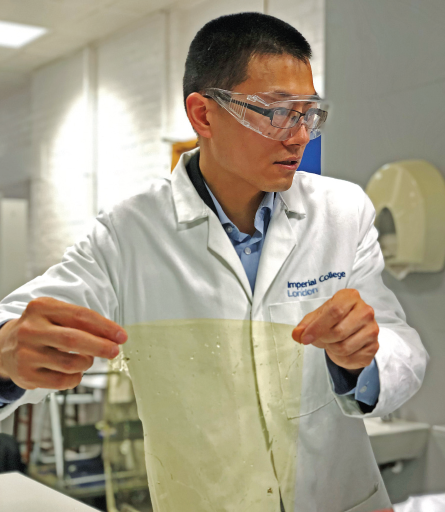Chinese scientist gets grant to help renewable energy research
By WANG MINGJIE | China Daily Global | Updated: 2019-09-30 11:09
A Chinese scientist from Imperial College London has landed a 1.5-million-euro ($1.64 million) grant from the European Research Council to further his research into flow batteries.

Song Qilei, from Imperial's department of chemical engineering, is researching next-generation cost-effective redox flow batteries-large energy storage devices that could power cities. He has been awarded an ERC starting grant-one of Europe's most prestigious scientific grants.
A typical flow battery consists of two tanks of electrolytes that are pumped past a membrane held between two electrodes. The membrane separator allows ions to transport between the tanks while preventing the cross-mixing of the electrolyte solutions.
Song has developed a membrane for a battery, a key component that improves the performance and lifetime of the flow battery, and is up to 16 times cheaper than the current method.
The 35-year-old said the research could help accelerate developments in renewable energy, mitigate climate change and solve the mismatch between intermittent supply of renewable energy and the variable power grid.
The project involves collaborations with researchers at Imperial College London, University of Edinburgh, University of Cambridge, and institutions in the European Union and China.
Song, who described the research as a 'dream project', said: "This grant will enable me to expand my team and move into new areas to pursue groundbreaking fundamental research in renewable energy conversion and storage. Our research will have a great impact for the development of renewable energy, such as solar and wind power, as well as the hydrogen economy, and contribute to sustainable development in Europe and the world."
ERC starting grants recognize talented early-career scientists who show potential to be research leaders and have a scientific track-record that shows great promise. Seven Imperial academics, including Song, were successful in being awarded ERC starting grants, being funded with a combined 11 million euros.
Nick Jennings, Imperial's vice-provost, said the college's seven academics recognized with the highly prestigious awards "have all shown the ability and ambition to be future leaders in their field".
"Imperial was one of the top recipients in Europe of these greatly sought-after grants-demonstrating our research excellence and standing among the world's very best institutions," he said.
























